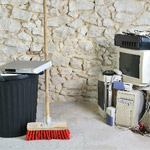
The pace of technological development in the modern age is simply breath-taking and new and improved models of computers, mobile devices and other IT equipment seem to be released on a daily basis. To even begin to keep pace with that development, therefore, businesses and individuals need to update and replace their equipment far more often than ever before.
As a result, there is also far more superseded and supplanted equipment that needs to be disposed of. In years gone by, someone who wanted to get rid of an old computer monitor or another item of IT equipment might just throw it away and think nothing else of it. Today, however, there are a huge number of considerations that should first be taken into account to ensure that any equipment is disposed of responsibly.
Security and Privacy Considerations
In an age when identity theft and other cyber-crime is rife, anyone disposing of IT equipment needs to understand how much of a treasure trove an old hard drive can be for an opportunist criminal. Even if files have been deleted, after all, a hard drive can still contain enough information for a savvy criminal to retrieve personal information, passwords, financial details and any other useful data that the drive may have contained.
If your disposing of any such equipment, therefore, and especially if you’re a company which holds data on customers or clients, it’s crucial to consider cyber-security. Having hard drives professionally wiped before disposal is often a good way to go, as is destroying the drive as wholly as possible or keeping it and disposing of the rest of the equipment without it.
Environmental Considerations
When we talk about responsibly disposing of IT equipment, it doesn’t only mean being responsible for your own security but also being responsible for the environment. Older IT equipment, after all, can contain elements and chemical constituents which are toxic, which emit harmful radiation or which cause otherwise damaging environmental effects.
Lead, Cadmium, Mercury and other such metallic elements, for instance, can feature as part of older IT equipment components and cause significant problems if they leach into ground water. Simply dumping IT equipment into landfill, therefore, is far from a responsible disposal method and looking into professional recycling services is a far better choice.
Legal Considerations
Largely due to the aforementioned environmental impacts that improper disposal of electronics can have, lawmakers have recently stepped in and passed legislation to ensure that companies and individuals take their responsibilities seriously. In the UK, and more widely across the EU, that legislation takes the form of the Waste Electrical and Electronic Equipment (WEEE) Directive.
That directive sets down the proper way for firms and private citizens to dispose of a whole host of different electrical and electronic devices, including a number of different types of IT equipment. Failure to comply with the directive by improperly disposing of such equipment, therefore, can have serious legal ramifications.
Criminal prosecution is both possible and likely for anyone found to be flouting the directive, and can be carried out in either a magistrate’s court or the crown court. Prosecution in a magistrate’s court can lead to a maximum fine of £5000, whilst there is no top limit on the fine that the crown court can hand down.
